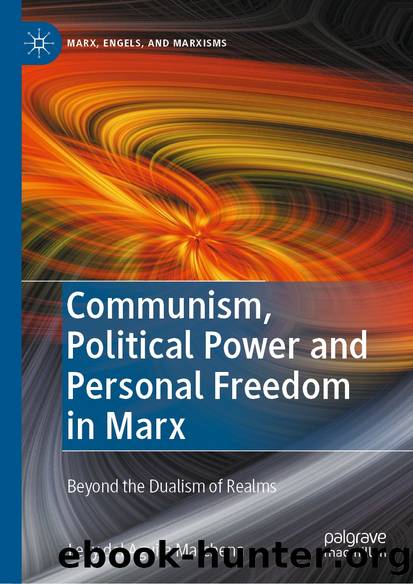Communism, Political Power and Personal Freedom in Marx by Levy del Aguila Marchena

Author:Levy del Aguila Marchena
Language: eng
Format: epub
ISBN: 9783030828943
Publisher: Springer International Publishing
3.4 Modern Convergences Against Political Power
We have specified some convergences of Marx with the liberal conceptions regarding the exercise of political power, convergences that reach the anarchist tradition inaugurated by Proudhon among the French socialists. Of course, the differences between Marx and this tradition are vast, although we cannot dwell on them here. They all share the principle of the priority of the individual over the State. It is a sort of fundamental civilizing premise that situates liberal, anarchist, and even Marxian approaches as modern perspectives on the relationship between the particular and the common in the midst of the post-feudal West. Our critical viewpoint is not directed against this convergence in the bet for individual freedom. Rather, it focuses on its specific valuation of the political dimension of human activity as a threat to, or an effective denial of, individual freedoms. These traditions prioritize the interest for caring and promoting freedom in modern terms; i.e., in accordance with a recognition of the particular agents individuated by the specific composition and structure of commodity-capitalist societies. Whether immediate or mediated, such an interest is presented as a denial of political life, of its own agency, and of the power at its disposal.
The image of the State as a ânecessary evilâ is echoed in different ways in each of these perspectives. For the liberal, it is presented in terms of the âinvisible handâ of the market, accompanied by the expectation that political power be limited, to the extent possible, to a function of law enforcement and/or administration of impersonal justice; the more invisible, the better. For the anarchist, it is expressed in the demand to end once and for all, without any mediation, the oppression that any State would represent per se for the individuals. Finally, it is affirmed in the Marxian banner of the âdictatorship of the proletariatâ: an undesirable instrument that affirms the momentary persistence of a sphere alienated from the praxis that rises over the whole of social activity. Far from representing some form of political vindication, as liberal vulgarity tends to assume, it is an instrument that can only be used in the meantime. Moreover, it is an ambiguous instrument, of a democratic nature from the viewpoint of its executors and of a dictatorial nature for its opponents; where the boundary between one and the other isâto say the leastâquite problematic (cf. RodrÃguez, 1996; Atienza, 2008, pp. 17â18). In any case, it is a mere means for the emancipation that will result in the abandonment of the political, in the experience of the social as a life in common free of mediations that distort it and that are motive, occasion, and reality of the oppression of some individuals over others.
Apropos of the conditions for human emancipation stemming from the conflict between the productive forces and the relations of production, The Poverty of Philosophy formulates the termination of this dimension of praxis, politics:Does this mean that after the fall of the old society there will be a new class domination culminating in a new political power? No.
Download
This site does not store any files on its server. We only index and link to content provided by other sites. Please contact the content providers to delete copyright contents if any and email us, we'll remove relevant links or contents immediately.
| Anthropology | Archaeology |
| Philosophy | Politics & Government |
| Social Sciences | Sociology |
| Women's Studies |
The Leavers by Lisa Ko(6474)
Born to Run: by Christopher McDougall(6262)
iGen by Jean M. Twenge(4702)
Sapiens by Yuval Noah Harari(4537)
The Kite Runner by Khaled Hosseini(4437)
Spare by Prince Harry The Duke of Sussex(4199)
Bullshit Jobs by David Graeber(3180)
Livewired by David Eagleman(3123)
Goodbye Paradise(2964)
Never by Ken Follett(2882)
A Dictionary of Sociology by Unknown(2518)
Harry Potter 4 - Harry Potter and The Goblet of Fire by J.K.Rowling(2416)
The Club by A.L. Brooks(2361)
People of the Earth: An Introduction to World Prehistory by Dr. Brian Fagan & Nadia Durrani(2346)
The Social Psychology of Inequality by Unknown(2311)
Machine Learning at Scale with H2O by Gregory Keys | David Whiting(2292)
Harry Potter and the Order of the Phoenix (5) by J.K. Rowling(2227)
0041152001443424520 .pdf by Unknown(2220)
Don't Sleep, There Are Snakes by Daniel L. Everett(2217)
